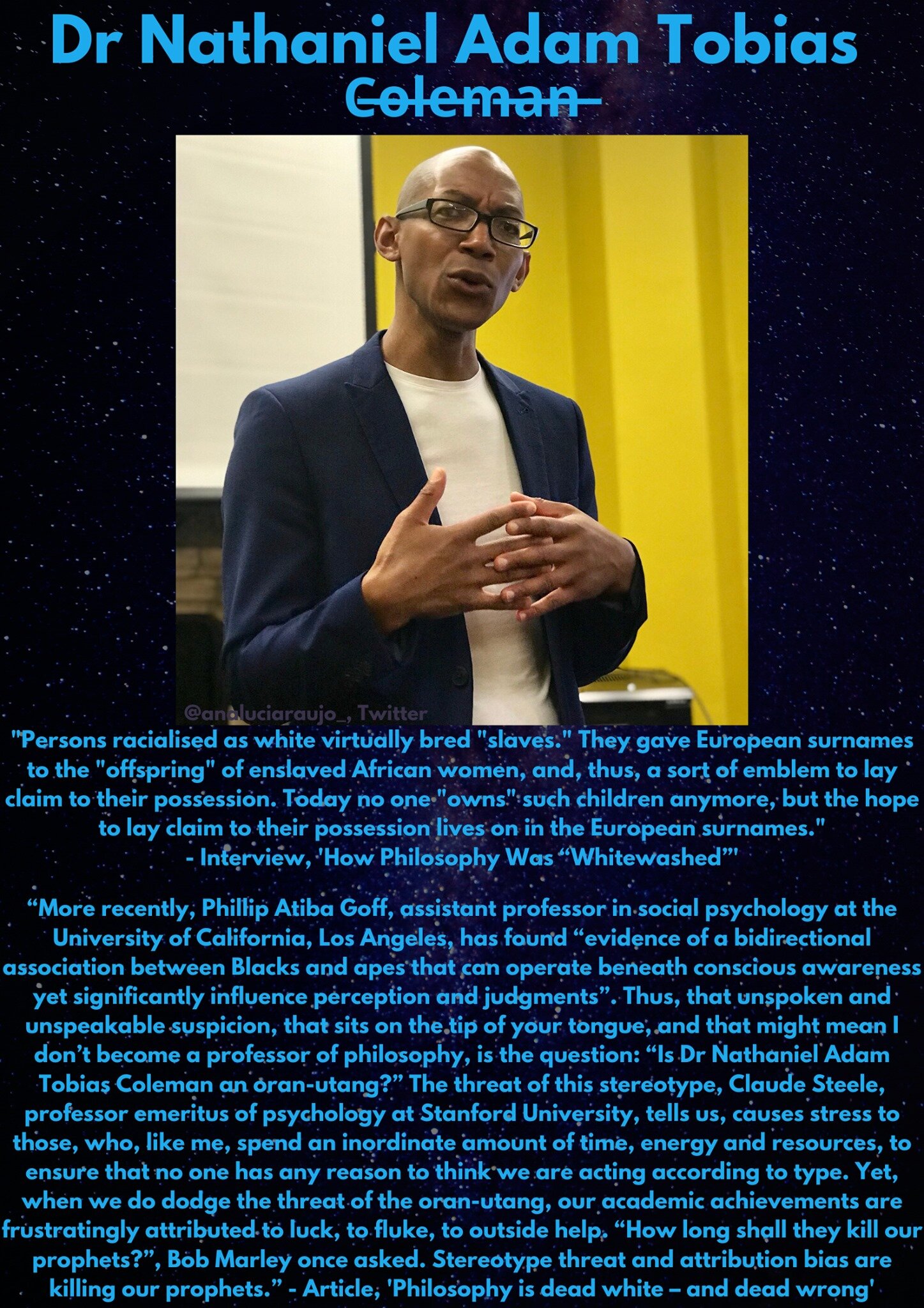
Nathaniel Adam Tobias Coleman
philosopher of race
Close to home (Oxford and the UK), the work of scholar-activist Dr Nathaniel Adam Tobias C̶o̶l̶e̶m̶a̶n̶ is exceptional. Ashley Singh takes a look at a subset of his career and achievements thus far.
Biography
Nathaniel Adam Tobias C̶o̶l̶e̶m̶a̶n̶ is the son of a Jamaican immigrant who grew up in Birmingham with single mother, Lorrel and his three siblings. He strikes through his last name as his family was given it when they were purchased from Jamaica. From King Edward’s School to Merton College, Oxford, Nathaniel graduated with a first in Classics. He taught English and Drama at Ashburton Community School, Croydon as part of the Teach First program before studying for his Master’s and PhD in Philosophy at the University of Michigan, Ann Arbour. During his time as a Research Associate in Critical Philosophy of Race at UCL, Nathaniel was named Online Communicator of the Year for a magnitude of vital public work alongside his research. This included starting reading groups, the ‘Why Is My Curriculum White?’ campaign and giving the talk recommended below, ‘Why Isn’t My Professor Black?’, while a part of Dismantling The Master’s House. In 2015, Nathaniel gave tutorials in Ethics and Theory of Politics as a Stipendiary Lecturer at Wadham College. (This is his reading list for the two papers.) He has since worked at Birmingham City University, University of Warwick, University of Birmingham, and University of Bristol.
Recommendation for ‘casual’ engagement
Nathaniel’s enchantingly eloquent and damning presentation answering ‘Why isn't my professor black?’ This is a reading of his article ‘Philosophy is dead white – and dead wrong’. Along with an illuminating response from John E. Drabinski’s blog. See here for more discussion on this issue.
And a short, shocking article on ‘the Academy’ in Britain’s complicity in inventing eugenics:
http://www.dtmh.ucl.ac.uk/eugenics-the-academys-complicity/
Describing his own philosophical work primarily on the subject of slavery:
“Different categories of person have, historically, argued in very different ways to explain the wrongness of various social phenomena commonly known, today, as 'slavery'. The arguments of ancient and mediaeval authors focussed on blasphemy, those of modern British abolitionists focussed on pain and (economic) loss, and those of modern French abolitionists focussed on violation of a right (of a "(white) man" to freedom). In each case, these arguments against 'slavery' were combined, and, indeed, compatible, with justifications for (capitalist, sexist, racist) colonialism.
By contrast, the arguments of anglophone African men focussed on capitalist violation of a right (of a "black man" to own himself), those of anglophone African women focussed on sexist-racist misogynoir in public evaluations of human excellence of character, and those of francophone Haitian revolutionaries focussed on colonial white domination founded on black genocide. The British and the French failed to listen, and the Prussians listened only to a degree, to these anglophone and francophone maroon African philosophers.
My response—to the failure of mainstream European canonised authors to listen fully to the definitional analyses and normative evaluations of marginalised African scholar-activists—is to focus on damage to the reputation of African persons, a damage that is informed by (capitalist, sexist, racist) colonialism. This deferential theory of anti-African Black Libel will bring African scholar-activists into co-productive conversation with Jewish scholar-activists who have theorised anti-Jewish Blood Libel.”
You can find out more about his past and ongoing work in his summary here: https://www.academia.edu/36335601/statement_of_past_and_present_research
Recommended paper
British Utilitarianism's justification of Negro Slavery
The content of this 3-page paper seems like something philosophers should know about if they are to know about British utilitarianism. What this aspect of the genealogy of utilitarianism means for the current state of utilitarianism or the glorification of figures such as J. S. Mill (when this is at the cost of the popularity of other ethical theories) are questions worthy of finding answers.
From the interview with Nathaniel linked to at the end:
“Britain was the state that demanded the abolition of the "slave trade" at the Congress—just as that Empire had already done through the Slave Trade Act of 1807. After the resolution was passed, the Great Powers gave themselves a pat on the back and described it as a sudden insight into the principles of humanity and universal morality, says C̶o̶l̶e̶m̶a̶n̶. They, thus, no longer presented themselves as enslavers, but as emancipators.
On closer consideration, this, as well as other things, reveal themselves as a "whitewashing" of history: Besides the euphemistic emancipatory representation, there is also the idea that, although "great white men" once put forward the arguments justifying slavery, they afterwards changed their mind, promising to help Africans and declaring that slavery is morally wrong.
But "Africans are philosophers. From the moment they were abducted they argued philosophically that it was unjust," C̶o̶l̶e̶m̶a̶n̶ says. But they weren't listened to, and even today they are missing from the canon of Eurocentric curricula and are not valued as philosophers.
... A central mark of difference to other forms of enslavement, such as those of antiquity, was "slave breeding," something that David Hume—a philosopher of the Scottish Enlightenment—had already identified. C̶o̶l̶e̶m̶a̶n̶ explains that a legal change in 17th century England—Partus sequitur ventrem—made "slave breeding" possible because, from this point onward, the societal status of women was passed on to their children.
This change not only broke with English tradition, according to which the status of a child was dependent on that of the father, but also made possible that persons racialised as white could increase the number of those enslaved by them by sexually abusing African women: the enslaved thus reproduced themselves. They were, so to speak, "bred" on site, such that the Great Powers realised they no longer needed to "resupply" from Africa, C̶o̶l̶e̶m̶a̶n̶ explains.”
Also:
A resource of papers on ‘Western Philosophy and White Tyranny’:
An interview titled ‘How Philosophy Was “Whitewashed’
He also wrote a paper about black men who have sex with men.
